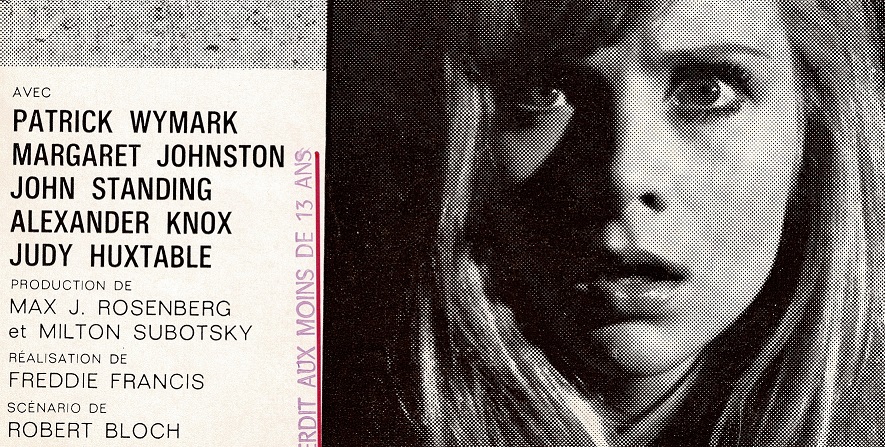 n
n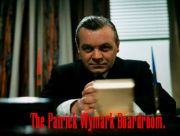
The Psychopath
 n
n
Hear Harry Dobermann discuss The Psychopath with Dr Terror here.
Patrick Wymark became a TV star playing a tycoon, but The Psychopath gives us a chance to see Wymark perform in the role most beloved of TV ...a detective.
The Psychopath was called The Puppet Murders in Germany , Bambola Di Cera (Dolls of Wax) in Italy and Poupees De Cendres (Dolls of Ashes) in France. These titles seem more poetic than the Anglo-American title of The Psychopath and perhaps this is why the film is only available in foreign language DVD's. Even though the film was written by Robert Bloch, author of Psycho, calling the movie The Psychopath smacks of |"me-too-ism" and sets itself up for a fall by drawing comparisons with Hitchcock . The English-language posters showed an image of actor John Standing in doll-like makeup next to a scrawled headline, "Mother, may I go out to kill?". The European posters emphasised imperilled Judy Huxtable and the mysterious murders. When first released the film played better in America than in Britain, but the movie had a strong reputation among enthusiasts. The first issue of the short-lived British magazine Supernatural (1969) included The Psychopath in a run-down of the ten best fantasy films of the previous three years, calling it "A dramatic, well-told story about a pursuit of a deranged killer." The magazine noted that, "some particularly gruesome murders came over all the more effectively because they were implied rather than shown."
Director Freddie Francis had made several psychological thrillers for Hammer Films, such as Paranoic and Maniac . Robert Bloch had written a string of novels examining compulsive murderers and had scripted Straitjacket and The Night Walker for William Castle. Bringing them together for the film (titled House of Dolls by Bloch but originally announced as Schizo) should have been a recipe for success. But somehow The Psychopath has fallen into obscurity. While some enthusiasts believe it is a precursor of the European giallo movies, this reputation hasn't translated into a UK DVD release.
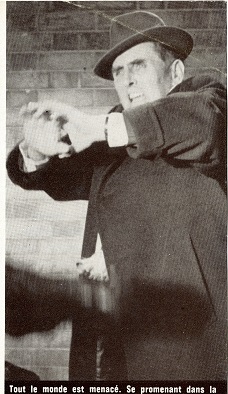
Beware! Many plot points are revealed below
The movie opens at night in a quiet London Mews. The killer drives up and shoots out the tyre of a parked Mini. Lawyer Reinhold Klermer (John Harvey, who played the Aviation Minister for whom John Wilder fell on his sword in the final episode of The Plane Makers ) comes out to find the flat tyre. He looks at his watch, tetches and pulls a musical instrument out of the car. He walks off to keep his appointment, stalked by the red car. As Klermer comes to a dead end, the car driver rams him against a wall. Although the car goes backwards and forwards, we only see and hear crunching of wheels crushing the violin case. As the car roars off, a doll in the image of Klermer is dropped over the wrecked instrument
In the next scene we see three members of an amateur string quartet playing classical music, while a score lies pointedly on a fourth chair. French artist Robert Crewdson and Dutch embassy worker Thorley Walters are two of the musicians. British businessman Alexander Knox is the third, glancing disapprovingly at Don Borisenko stroking the hand of Judy Huxtable (Knox's daughter in the movie). As the music ends, Knox observes that Klermer has not missed one of their weekly sessions for ages and confides that the lawyer had telephoned earlier saying there was something he wished to discuss.
At this point Patrick Wymark arrives as Inspector Holloway to announce that Klermer's body has been discovered, and to question everyone about their whereabouts. Fred Pizzoferrato observes, "Wymark is compelling, despite an interpretation that relies on all the cliches of British detectives; phlegmatic, smart, with sardonic humour; for instance, he asks the suspects what they were doing at 8pm and then reveals the murder took place an hour earlier."
Wymark uses small bits of action to colour in his character, such as massaging his aching ankles in a new pair of boots or studying his cigarette as he contemplates a suspect's alibi. In some ways, Wymark's performance is reminiscent of Alfred Hitchcock in the trailer for Psycho. When Don Borisenko offers that Klermer's death sounds like a hit and run accident, Wymark frowns. "Hardly an accident Mr Loftis. That car.." he raises and moves his hands as if playing with a toy car, "must have gone backwards and forwards over his body half a dozen times."
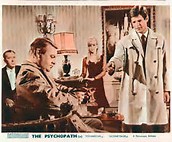
Wymark's investigation uncovers the strange dreamlike claustrophobia of the plot which may have triggered the comparisons with gialli movies. The four men were all members of an Allied Commission in post-war Germany. They accused a German industrialist, Von Sturm of using slave labour during the war, and this led to the confiscation of his property. Von Sturm committed suicide, but his wife and son came to London. Klermer was also their family solicitor in Germany and represented the family in their attempts to clear Von Sturm's name.
Wymark discovers that Mrs Von Sturm (Margaret Johnston) is a doll-maker, who has ordered several dolls of the type left at Klermer's murder. She is confined to a wheelchair with hysterical paralysis. Her son Mark (John Standing) confides that her whole world collapsed when his father died and she has retreated to a fantasy world with her dolls. He also confides that Klermer had given up trying to clear his father's name but had not told her because he thought it was better for her to live in hope.
As if this wasn't entwined enough, Wymark also learns that Judy Huxtable works at a firm which supplies dolls to Mrs Von Sturm. This leads to a droll scene with Harold Lang as Briggs, the precise manager of the toy wholesalers. He tells Wymark that, "We discontinued this line a year ago. I'm afraid there isn't much call for this sort of thing now you see." Lang wrings particular loathing out of the sentence: "Today it's all bombs and rocket ships. Aggressive plastic in rather vindictive colours. Personally I never want to sell anything you couldn't cuddle."
While Lang was a friend of Wymark's, his casting was probably a result of his earlier performance as Roy Castle's manager in Dr Terrors House of Horrors . Once again, Lang enlivens a very small part, using gestures to communicate in a similar way to the role of Silent in West 11 . Although amusing, Briggs views about toys appear to echo the beliefs of Milton Subotsky, who thought Hammer films were "violent and gruesome" and believed that horror films should be a combination of "scariness and imagination."
Wymark's first visit to the Von Sturm home is one of the strongest scenes in the movie. The music is by Elisabeth Luytens, who had already scored The Skull and Dr Terrors House of Horrors but the theme for The Psychopath is unlike a typical aggressive horror movie theme. It starts with a heartbeat, and a musical box theme, which gives way to a brass theme with a 'folky' feel, reminiscent of the wedding song from Prokofiev's Lieutenant Kije Suite. Combined with stop-motion visuals of doll parts being assembled, Luytens title theme creates an unsettling mood before the movie has started.
As Wymark approaches the exterior set of the Von Sturm house and knocks on the door, the musical box theme begins to play. A dog barks, and the theme builds in intensity as Wymark looks around and then knocks again. Suddenly the door swings open with a grinding motor whine. Wymark walks in, doffs his hat, glancing around the empty hall. Drum beats start as the exterior door shuts behind him. The drums rolls build and the full orchestra comes in as two interior double doors grind open. The orchestra takes up nursery theme quizzically as Wymark enters a room in which dolls cover the floor.. some moving .. others still. The scene is tremendously effective, reminiscent of The Avengers with the combination of creepiness and high-tech. It's tempting to wonder if the film could be recut as some kind of lost pilot for an ITC crime series.

As Wymark glances around the room, a voice invites him in. We discover Margaret Johnston as Hedwig Ilsa* Von Sturm, hidden in a corner. A vivacious leading stage actress, who would go on to play Lady Macbeth at the 1966 Chichester Festival, Johnston was reportedly disappointed in the quality of most of her film roles. She had played the limping university secretary Flora Carr in The Night of the Eagle (1962) and here plays a vengeful widow confined to a wheelchair.
*Harold Lang gives the delivery address for the dolls as 14 Ann Street, Mrs Hedwig Von Sturm. But Alexander Knox later addresses her as Ilsa Von Sturm. Maybe Knox misremembers, or maybe she prefers one name over another. Hedwig, meaning 'battle' certainly seems appropriate.
Like Brian Potter in Phoenix Nights it's never quite clear how extensive her hysterical paralysis is supposed to be. At one point we see her enraged and rising with difficulty to stagger out of the chair, but twice in the film she appears to move by magic. Early on, Alexander Knox hears a noise in his deserted house and goes downstairs to find the front door open and Johnston sitting in her wheelchair in the shadows. This in a 1960's London of high kerbstones, cobbled streets and no adjustments for disabilities. Later on, Hedwig appears at the remote boatyard in which her son works. On both occasions her son appears unaware of what she is doing (and later on it's implied that she handles a dead-weight without any help from her son). Perhaps they should have given Hedwig an accomplice ... perhaps Mary, the faithful but conveniently absent maid of Alexander Knox, played by Olive Gregg (who would later provide the voiceover for Ingrid Pitt in Countess Dracula ).
In the spirit of her melodramatic introduction, Johnston obviously decided to take no prisoners in this role. When Wymark introduces himself as Detective Inspector Holloway, Johnstone gives a drawn out "PO--lice?" and then invites Wymark into "my vorkroom".. When he asks if she makes her dolls to sell, Johnston laughs and coos to a doll, "Listen to him. I vould not dream of selling my children".
But when she later confronts Alexander Knox in his home, we see the controlled vengefulness beneath. When he tells her that the business with the Allied Commission is over, she replies, "Nothing ever ends...except life itself!" Knox clutches his chest and pleads that he has a heart condition, and she venomously replies, "You never had a heart."
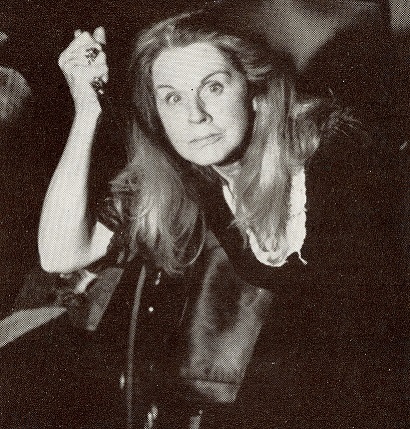
As Robert Crewdson's character explains to Wymark, the motivation for falsifying evidence against the elder Von Sturm was that, "There were huge profits to be made. Sometimes when a man's property was confiscated, a portion of it disappeared."
So the film creates a situation in which four men have been instrumental in ruining a family and have possibly plundered their assets. One of those men is also the lawyer for the family. All of them are now living in London. Margaret Johnston's doctor (another lively cameo from Colin Gordon) is also Alexander Knox's doctor. It is as if these people are bound together by the past (or perhaps Klermer and the others want to keep an eye on the Von Sturm's to ensure they don't get too close to the truth). But then Holloway who starts out as a detached, cerebral detective soon finds himself drawn into the path of the killing machine. He discovers a doll in his own likeness and knows that his own days are possibly numbered.
At this point, it's probably worth acknowledging that The Psychopath did not have a seamless passage from script to screen. When he visited the set during production, Robert Bloch observed that his script had been amended, both to save money and for other reasons. Just as director Francis and producer Milton Subotsky both made claims to have rescued The Skull (Francis claiming to have improvised sequences after Subotsky's script ran short, and Subotsky claiming to have created the ending in the editing suite) both Subotsky and Francis claim to have created new scenes to bulk out Bloch's short-running script, with Subotsky then "changing the murderer" by recutting Wymark's dialogue in the penultimate scene. The character of Gina (who contributed one of the film's enduring marketing images) was a result of this expansion. During the scene at the toy wholesalers, Gina (Gina Gianelli) brings Harold Lang the list of customers. While the dialogue between Lang and Wymark continues, the camera suddenly cuts to an odd prolonged close-up of Gina from a different angle, looking Wymark up and down. It stands out because it just seems odd. In retrospect, it may be an attempt to emphasise Wymark's dialogue confirming that six dolls were delivered. Later on, in one of the tagged on scenes Mark Von Sturm (John Standing) begs Gina to get him six more dolls so he can "prove" his mother's dolls weren't used in the murders. When she refuses, it isn't long before Gina is attacked by the black-gloved killer.
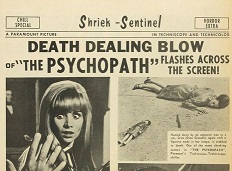
Unfortunately, these stories of last-minute improvisations only muddy the waters. Despite a half-hearted attempt to shift suspicion onto Canadian actor Don Borisenko* (as Huxtable's fiance, an impoverished medical student) the audience is left in little doubt that John Standing's Mark Von Sturm is the killer. Ten years after making his stage debut, Standing is noticeably accomplished as the weak, superficially charming Von Sturm. The moment when he finally attacks Wymark is chilling because it's so matter-of-fact. Von Sturm is not a raving maniac; just self-centred and without conscience. The fact that his deranged mother (Margaret Johnston) is not physically paralysed does not provide convincing evidence that she could be the black-gloved killer who stalks one victim through a junkyard with a noose, and roasts another with a blowtorch.
*It's possible that Borisenko was deliberately cast as a red-herring, since he had played the manipulative killer in a 1964 BBC adaptation of Ira Levin's A Kiss Before Dying directed by Peter Sasdy. Borisenko was subsequently cast as Vernon Pinkley in The Dirty Dozen but unfortunately walked off set after a disagreement with director Robert Aldrich.
After one victim is poisoned, Wymark consults the family doctor.Colin Gordon (who had played Johnston's husband in Night of the Eagle ) chides Wymark for his use of the term prussic acid. "Hydrocyanic acid.Cyanide. I haven't heard the term prussic acid used for years!"
This amusing exchange draws attention to the influence of World War Two on crime fiction. Death by poison...prussic acid is something from the pre-war world of Agatha Christie and Dorothy L Sayers. But Hydrogen Cyanide was the central component of Zyklon B , the weed-killer used to carry out mass murder at the Nazi concentration camps. The Allied Control Council, set up to administer Germany after the Nazi surrender, passed a law to specifically confiscate all assets owned by IG Farben, the owner of the Zyklon B patent. The directors of Farben were among those industrialists put on trial for the use of slave labour during the war. *
The central mystery of The Psychopath reminds us of the moral sickness only twenty years past. As Robert Bloch told Douglas E. Winter, "I realized, as a result of what went on during World War II ...that the real horror is not in the shadows, but in that twisted little world inside our own skulls."
This was not, in fact, Wymark's first performance as a detective. He had played Porfiry in a 1965 TV adaptation of Crime and Punishment and Boucard, a french policeman providing security to a millionaire in the 1961 Tv play The Takers. Most significantly, he played Fred, another French detective in a 1962 adaptation of Cocteau's The Typewriterwhich also starred Margaret Johnston. Did Milton Subotsky watch that play? We will never know. Certainly Wymark was praised for bringing "a touch of humanity" to the proceedings.
So how does Patrick Wymark fare as a detective? Unfortunately, the script does not provide for a Poirot moment where the plot is revealed to the assembled suspects. In The Plane Makers, Wymark excelled at scenes where he confronted his opponents and revealed how he'd turned the tables on them. But there was none of that here. As far as the script allows, Wymark delivers a portrait of a cynical, world-weary pursuer of the truth.
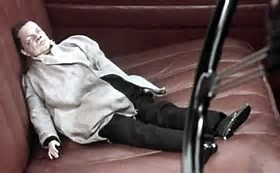
*Although there was no evidence of individual corruption in the process, it is also alleged that the British and American powers appropriated German patents, copyrights and trademarks in the immediate post war period, boosting the fortunes of Anglo-American companies at the expense of German firms. In the early post-war days, German industrialists were allegedly threatened with internment if they disclose trade secrets under interrogation. In effect, the allied powers are alleged to have done to German trade, what Klermer and his colleagues did to the Von Sturm's.